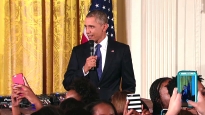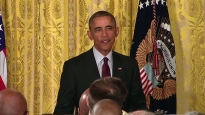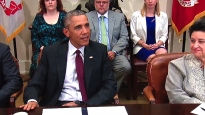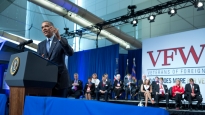President Obama on Race to the Top
July 25, 2009 | 19:03
President Obama gives remarks at the Department of Education on “Race to the Top,” a competition to get states to implement school reforms that produce real results. The $4.35 billion fund will reward eligible states for their accomplishments, and create incentives for future improvements. July 24, 2009. (Public Domain)
Remarks by the President at the Department of Education
THE WHITE HOUSE
Office of the Press Secretary
______________________________________________________________________
For Immediate Release July 24, 2009
REMARKS BY THE PRESIDENT
ON EDUCATION
U.S. Department of Education
Washington, D.C.
Office of the Press Secretary
______________________________________________________________________
For Immediate Release July 24, 2009
REMARKS BY THE PRESIDENT
ON EDUCATION
U.S. Department of Education
Washington, D.C.
1:34 P.M. EDT
THE PRESIDENT: Thank you for the outstanding introduction from Matthew. And Matthew's teacher, you're doing obviously an outstanding job -- although I understand Matthew's mom is also a teacher who has also won awards for her outstanding work. So the acorn doesn't fall far from the tree. We are very proud of him.
THE PRESIDENT: Thank you for the outstanding introduction from Matthew. And Matthew's teacher, you're doing obviously an outstanding job -- although I understand Matthew's mom is also a teacher who has also won awards for her outstanding work. So the acorn doesn't fall far from the tree. We are very proud of him.
Obviously I want to thank my wonderful Secretary of Education, Arne Duncan, who has helped to lead us. (Applause.) I want to thank all the members of Congress who are here, the governors who are in attendance. And I want to give a special shout out to Chairman George Miller of the Education Committee in the House, who has just been a outstanding partner for reform. Please give him a big round of applause. (Applause.)
You know, from the moment I entered office, my administration has worked to beat back this recession by creating jobs, unfreezing credit markets, extending unemployment insurance and health benefits to Americans who are out of work. But even as we've worked to end this immediate crisis, we've also taken some historic measures to build a new foundation for growth and prosperity that can help secure our economic future for generations to come.
One pillar of this new foundation is health insurance reform that can control deficits, and reduce costs for families and businesses, provide quality affordable care for every American. Another pillar is energy reform that makes clean energy profitable, that creates green jobs that can't be outsourced, and frees America from the grip of foreign oil. We're also working to enact financial reforms that will set up firm rules of the road to help prevent an economic crisis like the one we've just gone through from ever happening again.
But even if we do all of those things, America will not succeed in the 21st century unless we do a far better job of educating our sons and daughters, unless every child is performing the way Matthew is performing. In an economy where knowledge is the most valuable commodity a person and a country have to offer, the best jobs will go to the best educated -- whether they live in the United States or India or China. In a world where countries that out-educate us today will out-compete us tomorrow, the future belongs to the nation that best educates its people. Period. We know this.
But we also know that today, our education system is falling short. We've talked about it for decades but we know that we have not made the progress we need to make. The United States, a country that has always led the way in innovation, is now being outpaced in math and science education. African American, Latino students are lagging behind white classmates in one subject after another -- an achievement gap that, by one estimate, costs us hundreds of billions of dollars in wages that will not be earned, jobs that will not be done, and purchases that will not be made. And most employers raise doubts about the qualifications of future employees, rating high school graduates' basic skills as only "fair" or "poor."
Of course, as I said before, we've talked about this problem for years. For years, we've talked about bad statistics and an achievement gap. For years, we've talked about overcrowded classrooms and crumbling schools and corridors of shame across this country. We've talked these problems to death, year after year, decade after decade, while doing all too little to solve them.
But thanks to Arne's leadership, thanks to George Miller's leadership, thanks to all the dedicated Americans in statehouses, and schoolhouses, communities across this country, that's beginning to change. We're beginning to break free from the partisanship and the petty bickering that have stood in the way of progress for so long. We're beginning to move past the stale debates about either more money or more reform, because the fact is we need both. We're beginning to offer every single American the best education the world has to offer from the cradle to the classroom, from college to careers.
In recent months, I've spoken about the different parts of this strategy. I've spoken about what we're doing to prepare community college students to find a job when they graduate; to make college and advanced training more affordable; and to raise the bar in early learning programs. Today, I want to talk about what we can do to raise the quality of education from kindergarten through senior year.
Because improving education is central to rebuilding our economy, we set aside over $4 billion in the Recovery Act to promote improvements in schools. This is one of the largest investments in education reform in American history. And rather than divvying it up and handing it out, we are letting states and school districts compete for it. That's how we can incentivize excellence and spur reform and launch a race to the top in America's public schools.
That race starts today. I'm issuing a challenge to our nation's governors, to school boards and principals and teachers, to businesses and non-for-profits, to parents and students: if you set and enforce rigorous and challenging standards and assessments; if you put outstanding teachers at the front of the classroom; if you turn around failing schools -- your state can win a Race to the Top grant that will not only help students outcompete workers around the world, but let them fulfill their God-given potential.
This competition will not be based on politics or ideology or the preferences of a particular interest group. Instead, it will be based on a simple principle -- whether a state is ready to do what works. We will use the best evidence available to determine whether a state can meet a few key benchmarks for reform -- and states that outperform the rest will be rewarded with a grant. Not every state will win and not every school district will be happy with the results. But America's children, America's economy, and America itself will be better for it.
And one of the benchmarks we will use is whether states are designing and enforcing higher and clearer standards and assessments that prepare a student to graduate from college and succeed in life. Right now, some states like Massachusetts are setting high standards, but many others are not. Many others are low-balling expectations for students -- telling our kids they're prepared to move on to the next grade even if they aren't; awarding diplomas even if a graduate doesn't have the knowledge and skills to thrive in our economy.
That's a recipe for economic decline, and it has to stop. With the Race to the Top fund, we will reward states that come together and adopt a common set of standards and assessments. Now, let me be clear: This is not about the kind of testing that has mushroomed under No Child Left Behind. This is not about more tests. It's not about teaching to the test. And it's not about judging a teacher solely on the results of a single test.
It is about finally getting testing right, about developing thoughtful assessments that lead to better results; assessments that don't simply measure whether students can use a pencil to fill in a bubble, but whether they possess basic knowledge and essential skills like problem-solving and creative thinking, creativity and entrepreneurship. And already, 46 states are working to develop such standards. I urge those 46 states to finish the job. I urge the other four to get onboard. (Laughter.)
One of the other benchmarks we'll be using in awarding Race to the Top grants is whether outstanding teachers are being placed in our classrooms. From the moment a student enters a school, the single most important factor in their success is the person in front of the classroom. Every one of us can point to a teacher who inspired us and in some way shaped the course of our lives. Great teachers are the bulwark of America. They should be valued and they should be honored. Few have worked harder to do that than our national union leaders. Randi Weingarten is right here, and Dennis Van Roekel -- (applause) -- are two union leaders who are here, and I'm very pleased that they're with us today.
But if we're honest with ourselves we'll admit that in too many places, we have no way -- at least no good way of distinguishing good teachers from bad ones. As Arne has pointed out in the past, they have 300,000 teachers in California. The top 10 percent are 30,000 of the best that are out there. The bottom 10 percent are 30,000 of the worst out there. The problem is, we have no way to tell which is which.
That's where data comes in. Some places are keeping electronic records of how a student does from one year to the next and how a class does in any given year. This helps students, parents, teachers, principals, and school boards know what's working and what's not in the classroom. You know, basketball coaches have a game tape for the team to see what they did right and what they did wrong after a tough series -- teachers and principals should have a way of doing the same.
Now, I recognize there's a concern among some that a teacher won't be judged fairly when we start linking students' performance to the performance of their teachers. And that's why we need to bring teachers into the process and make sure their voices are heard. (Applause.) And that's why we need to make sure we use tests as just one part of a broader evaluation of teachers' performance.
But let me be clear: Success should be judged by results, and data is a powerful tool to determine results. We can't ignore facts. We can't ignore data. That's why any state that makes it unlawful to link student progress to teacher evaluations will have to change its ways if it wants to compete for a grant. That's why the Race to the Top grants will go to states that use data effectively to reward effective teachers, to support teachers who are struggling, and when necessary, to replace teachers who aren't up to the job.
But let me be clear: Success should be judged by results, and data is a powerful tool to determine results. We can't ignore facts. We can't ignore data. That's why any state that makes it unlawful to link student progress to teacher evaluations will have to change its ways if it wants to compete for a grant. That's why the Race to the Top grants will go to states that use data effectively to reward effective teachers, to support teachers who are struggling, and when necessary, to replace teachers who aren't up to the job.
And we also need to reward states that are placing outstanding teachers in schools and subjects -- like math and science -- where they're needed most. That's one way to foster the next generation of math and science teachers. And by the way, everyone has a role to play in training these teachers. So universities and nonprofit organizations can launch programs like UTeach at UT Austin that allows aspiring teachers to get a math or science degree and teaching certificate at the same time. And businesses can follow the examples of Intel and Microsoft by developing the software tools and cutting-edge technologies that prepare today's students to be tomorrow's teachers.
So we know we need better standards, and we know we need excellent teachers. But we also know that a number of chronically underperforming schools will require an extra effort to get back on their feet. Roughly 5,000 schools across this country -- the bottom five percent -- fall into this category. In fact, just 2,000 high schools produce over 50 percent of America's dropouts.
Now, there is no silver bullet when it comes to turning these schools around. We know that many of these schools are in very tough neighborhoods, and kids are coming to school already with some significant problems. And the most effective and innovative approaches will be developed outside of Washington in communities across this country. The best ideas will come from educators who are helping a young man who's far behind to catch up; or helping a young woman master the English language; or going the extra mile for a student with special needs. Change will come from the bottom up.
But what we can do, all of us in federal government, is reward states that are pursuing forceful and effective and consistent approaches with Race to the Top grants. There are a number of different strategies that school districts are employing to fix these schools that are in such tough shape. One strategy involves replacing the principal, replacing much of the staff, and giving the school a second chance. Another strategy involves inviting a great nonprofit to help manage a troubled school. A third strategy involves converting a dropout factory into a successful charter school. These are public schools funded [sic] by parents, teachers, and civic or community organizations with broad leeway to innovate.
Now, we can't hold charter schools to lower standards than traditional public schools. If a charter school is falling short year after year, it should be shut down. But if we're holding charter schools accountable and if we are holding them to a high standard of excellence, then I believe they can be a force for innovation in our public schools. And that's why I've encouraged states to lift caps on the number of charter schools that are allowed -- something being done in Louisiana, Indiana, and across the country. And that's why we will reward states that pursue rigorous and accountable charter schools with Race to the Top Fund grants.
Better standards. Better teaching. Better schools. Data-driven results. That's what we will reward with our Race to the Top Fund. But as I've said before, fixing the problem in our schools is not a task for Washington alone. It will take school administrators, board presidents, and local union leaders making collective bargaining a catalyst -- and not an impediment -- to reform. It will take business leaders asking what they can do to invest in education in their communities. It will take parents asking the right questions at their child's school, and making sure their children are doing their homework at night.
And it will take students -- I'm not worried about Matthew, but all the other ones -- (laughter) -- including my daughters -- showing up for school on time and paying attention in class. Ultimately, their education is up to them. It's up to their parents. It's up to their teachers. It's up to all of us.
I'll never forget a school I visited one day when I was a community organizer in Chicago. As I walked around the school with the principal, I remember saying to her how wonderful it was to see all these kids so full of energy and hope and the spark in their eye. And when he asked them what they were going to be when they grew up, they said, we're going to be doctors and lawyers and they all had these big dreams for the future. And I remember the principal saying that soon all that would change; that in a year or two, something would shut off inside as they began to realize their hopes wouldn't come to pass -- not because they weren't smart enough, not because they weren't talented enough, but because they didn't see a pathway to success.
And that's true of too many children in this country. Maybe they don't have a great teacher. Maybe they don't find their classes exciting. Maybe they aren't being challenged at school. Maybe their parents aren't pushing them the way they need to. Maybe nobody is setting high expectations for them. Maybe they can't afford a college education. Maybe they don't know anybody who's ever gone to college. And the reason you're here, the reason Arne is here, the reason I'm here, is to make sure that we are giving all of those children, all our children, the pathways they need to make the most of their abilities; to make the most of their opportunities; to make the most of their lives.
I am absolutely confident that if I do my part, if Arne does his part, if our teachers do their part, if you do yours, if the American people do theirs, then we will not only strengthen our economy over the long run, and we will not only make America's entire education system the envy of the world, but we will launch a Race to the Top that will prepare every child, everywhere in America, for the challenges of the 21st century.
I'm convinced we can do that. But it's not going to come easy, it's not going to come quick. We're going to have to have staying power, we're going to have to be consistent, we're going to have to put the interests of our children ahead of our own parochial interests. But we have no choice. And I'm absolutely confident that we can make it happen.
Thank you very much everybody. God bless you. (Applause.)
END 1:53 P.M. EDT
|
July 24, 2015
|
July 23, 2015
|
July 23, 2015
|
July 23, 2015
|
|
July 22, 2015
|
July 22, 2015
|
July 22, 2015
|
July 21, 2015
|
- &lsaquo previous
- …
- 116
- 117
- 118
- 119
- 120
- 121
- 122
- 123
- 124
- …
- next &rsaquo







